Learning Mandarin at the MTC in Taipei, part 2: teaching and testing methods, plus an overview of my teachers
- By Robyn Lee
- Sep 17, 2017
- Comments
Note: I currently live in Norway. I lived in Taipei from August 2014 to June 2015 and am veeerrrryy sloooowly writing posts about my time there.
This is my second post about my experience learning Mandarin at the Mandarin Training Center (aka the MTC, 師大國語教學中心) in Taipei from 2014 to 2015. In part one, I gave some background information about why I wanted to learn Mandarin at the MTC and I answered random questions about my experience at the school. In this post, I'll focus on describing general teaching and testing methods at the MTC and how each of my three teachers conducted their classes. (Keep in mind that my experience reflects the intensive classes, not the regular classes.) I won't touch upon the learning objectives or material of each term. For more info on that, check out this PDF from the MTC's website.
The teacher's responsibility is to cover the material in the textbook and prepare students for the level-wide final at the end of the term. How they teach the material is up to them. Judging from the three teachers I had and feedback from friends in other classes, every teacher has their own style. Some teachers are better than others, although I'd imagine that there are more good teachers than not. In the beginning of each term, you can switch to a different class if you don't like the one you're assigned. Some of my friends did this because their teachers or classmates were lackluster or otherwise not a good fit. I never felt compelled to switch my classes, but I heard it's quite common to do.
No matter what teacher you have, you'll be taking a lot of tingxies (聽寫, tīngxiě), aka dictation tests. During a tingxie, the teacher recites words, phrases, or sentences while you write down the characters, possibly with pinyin and tone marks depending on the teacher's requirements. You'll have a tingxie almost every day to test whether or not you thoroughly crammed those five to 15 new characters into your brain the night before. Without tingxies, I would've never studied as hard as I did.
Besides the daily-ish tingxie, you'll be tested at the end of each chapter. My teachers usually gave a chapter test every four or five school days. The teachers make up their own tests, so I imagine they can vary quite a bit between classes within the same level.
There's an accompanying workbook and CD for each textbook. I would assume that every teacher assigns the workbook assignments to their students like mine did, but perhaps in different ways. Some teachers may go over the exercises in class while others don't. Some teachers may assign extra work while others only use the workbook. I've also heard of teachers using workbook assignments as chapter tests. In my case, I was assigned the workbook exercises as homework each term.
At the end of each term you'll be assigned a final presentation project that will be filmed and given to you on a CD for your future enjoyment/embarrassment. For examples, here are the presentation topics I chose, all based on guiding topics my teachers had assigned: Taipei vs. NYC (Term 1), My Life in Taipei (Term 2), and An Introduction to the US (Term 3). I'm not sure what kind of liberty the teachers get with these topics or if most teachers do similar stuff.
Each term you may or may not take a class field trip—it's up to the teacher and your class's schedule. My first two teachers took our classes on field trips, but my third one didn't.
A few weeks before the end of each term, you'll take a final test that is the same for all students who have covered the same material. The score you get on this test determines your placement for the next term—that is, whether you'll continue to the next level or have to redo a few chapters before you can move on. I don't remember what the grade cut-offs are, but the C I scraped by with on my Level 3 final would've allowed me to continue to Book 4 in the following term, had I stayed at the MTC. (I managed to get Bs on my finals from Level 1 and 2. I think near the end of Level 3, I was feeling burnt out after nearly nine months of classes, especially since I knew it was my last term.)
As for what happens during those last few weeks after the final until the end of the term, they're just like normal classes—you'll cover a few more chapters of the book—except with most students feeling less motivated because the final is already over. Or if not most students, me. The material from those last chapters generally flew straight through my brain, ultimately landing on the forever-growing heap of "Characters I Should Know But I Don't".
In the next three sections, I'll talk about my teachers and what their teaching styles were like. (But if you're looking for a TL;DR, here you go: I liked all my teachers!) I'll refer to each teacher as laoshi, which is just Mandarin for "teacher" (老師, lǎoshī).
Term 1, Level 1: Guan Laoshi (管台英)
I feel incredibly lucky to have had Guan Laoshi as my first teacher at the MTC. She was one of the most exceptionally enthusiastic and energetic teachers I had ever had. Those traits provided crucial support when it came to keeping up my will to live spend hours each night memorizing handfuls of new characters and suppressing my violent rage towards characters that I didn't think made any sense.
For someone decades older than her students, Guan Laoshi and her seemingly superhuman energy level made me feel even more like a waste of youth than I already felt. She was sweet, funny, motherly, and sometimes a little odd, like the eccentric Chinese auntie I never had. She displayed a real passion about teaching and making sure her students succeeded.
My class didn't test the boundaries of what she was willing to teach us, but my impression was that she was open to anything. At least once she broke out in laughter because someone mispronounced a word in a way that it sounded like another word that meant "shit". Alas, I don't remember what the word was. I'll pretend that's for the best.
Guan Laoshi was particularly focused on good pronunciation. She clearly explained and demonstrated how to pronounce the sounds we had difficulty with, and considering each person in our class had a different mother tongue, we probably all had different problem areas. She would also test us on how well we could recite dialogues in the book from memory for the speaking part of her chapter tests. I wasn't a fan of this method at first, but after a while I found that practicing the dialogues by myself or with classmates did make a noticeable impact. Sentence structures, tones, and words became more natural. This may seem like an obvious exercise to improve one's Mandarin (or any language), but it's not the kind of thing I would practice on my own without it being on a test.
For better or worse, Guan Laoshi usually spoke English to us when giving explanations. This makes sense considering that we were sub-kindergarteners who wouldn't be able to understand explanations in Mandarin, but it must have been tough for my one classmate who wasn't fluent in English. On the upside, if you need something explained in English, Guan Laoshi will definitely be able to help you. And I'll note that her frequent use of English is probably limited to Level 1 classes. When Guan Laoshi took my class and her Level 4 class on a field trip together, one of my friends in her Level 4 class remarked that it was the first time he had ever heard her speak English. I imagine that with her fun, sociable attitude, she must've be a great teacher to have in Level 4.
As for that field trip, Guan Laoshi took us to two places in New Taipei City: Yehliu Geopark, home of the famed but eroding Queens Head rock formation, and Juming Museum, a mostly outdoor sculpture park displaying the works of Taiwanese sculpture artist Ju Ming. If you're looking for worthwhile day-trips out of Taipei, put these on your list. I don't have much of a better description of the trip than IT WAS AAWESSOOOOME. It certainly helped develop comradery among my classmates and an appreciation for Taiwan's nature and art early on in my studies.
Term 2, Level 2: Lin Laoshi (林秋翠)
Lin Laoshi was a great teacher when it came to balancing increasingly difficult class material with having fun (or at least not being totally bored and lost), as well as giving good practice in both speaking/listening and reading/writing. Like Guan Laoshi, Lin Laoshi was also fun, enthusiastic, and energetic, just less eccentric (or maybe she was eccentric and we just didn't know it). She showed a great deal of enthusiasm for teaching as well as concern over whether we understood the material or not.
But a huge difference from Guan Laoshi (or Level 1, to be more fair) became apparent from the beginning of my first class: Lin Laoshi spoke to us in Mandarin 99 percent of the time. Considering I had just spend three months in an English-heavy class, that first day with Lin Laoshi sent me (and probably all my classmates) into a quiet panic. I remember spending much of that first class with a feigned look of comprehension as I mentally hyperventilated all the confidence out of my pores.
However, it wasn't long after the first class that I actually could understand most of what she was saying. IT FELT LIKE MAGIC. Or knowledge acquisition. And during those few times when the magic ran out and my classmates and I were as confused as these puppies, Lin Laoshi would switch to English.
One of my favorite things about Lin Laoshi's class was that we played games! ...Or at least one game, a vocabulary review flashcard game that was sort of like Taboo without the taboo words. As the term progressed and our vocabulary grew, the game became more fun. It also became more competitive as we gradually switched from treating each other like classmates and more like siblings, unafraid to draw each other's blood. (My classmates were super cool. I still miss them.)
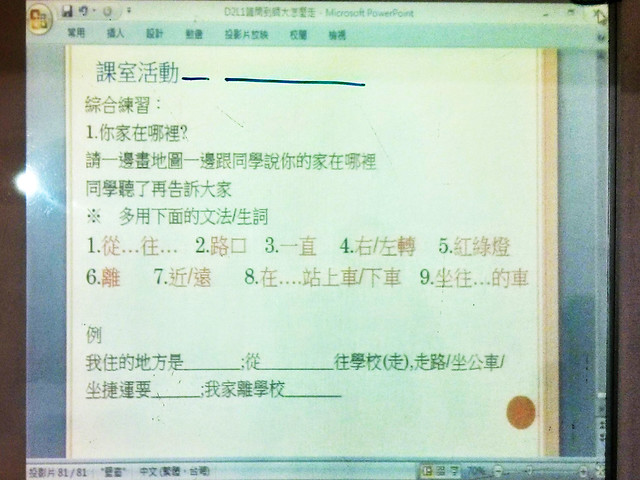
- An example in-class exercise done in pairs. Student 1 would draw a map of how to get to their home from school while explaining the directions to Student 2. Then Student 2, incorporating the new vocabulary we learned, would have to explain the directions to the class.
We also often did cooperative speaking and writing exercises in pairs, which was an enjoyable-enough and effective way to force use to write on the spot and discuss in Mandarin with each other.
I also liked the way Lin Laoshi conducted the speaking part of her chapter tests. After giving us time to think about a topic she wrote on the test, she'd call on us individually to come outside the classroom and discuss our answers as everyone else worked on the written part of the test.
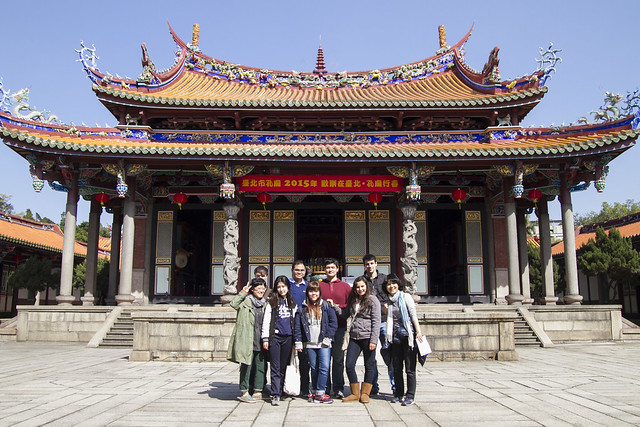
- Group photo with my class in front of Confucious Temple.
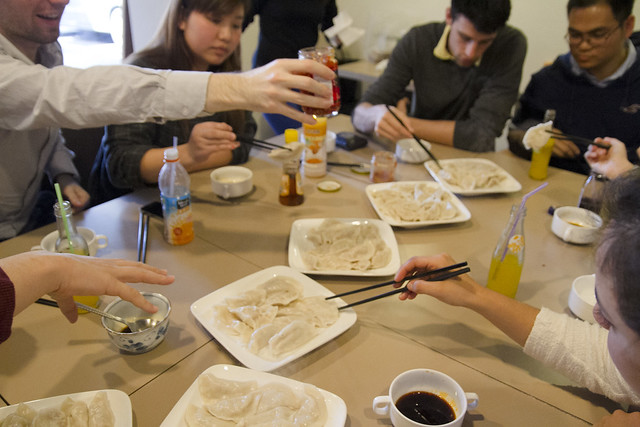
- Classmates digging into freshly boiled dumplings.
For our field trip, we joined Lin Laoshi's other class and stayed within the city limits, visiting Confucious Temple (孔廟) and the neighboring Bao'an Temple (保安宮). We ended with a dumpling-making session at Midori House (米多麗小館), a restaurant near Taida that I believe was run by Lin Laoshi's sister. I regret I didn't go back to the restaurant to try their regular menu (which, as far as I can tell, does not contain dumplings). Judging from this review, they make simple curry rice plates and vegetable-heavy rice bowls, which are some of my favorite kinds of food.
Term 3, Level 3: Wang Laoshi (王士銓)
When I start a new class, I wonder about the usual things, like What will my new classmates be like? or How difficult will the course work be? In Wang Laoshi's case, another question overshadowed the others: How different will Wang Laoshi be from my first two teachers?
I'm embarrassed to admit that I only asked myself this question because of one difference between Wang Laoshi and my first two teachers: He's a "he". This shouldn't be anything worth noting, but in a school where the women-to-men faculty ratio overwhelmingly leans towards women, it sort of is. Out of the 158 teachers currently listed on the MTC's faculty roster, I only counted about ten men, or about six percent of the faculty. In real life, I had noticed maybe one male teacher in the hallways during my first six months at the MTC. Without realizing it, I had gotten used to the feeling of being surrounded by exuberant, motherly aunties.
Anyway, back to that question. How different was Wang Laoshi from my first two teachers? I wouldn't place him in the "exuberant, motherly auntie" category, but I'd say his teaching styling still came with the care, attention, and enthusiasm I had gotten from my previous teachers, just shown in different ways. If Guan Laoshi and Lin Laoshi were cones of vanilla soft serve covered in rainbow sprinkles, Wang Laoshi was a cone of vanilla soft serve with rainbow sprinkles hidden in the middle. (I know that's not a thing, but pretend it's a thing.) Examples of these more slowly revealed "sprinkles" include the time he showed us a slideshow of photos of his cat for reasons I can't recall (not that anyone needs a reason to show off their cat—I ACCEPT CAT PHOTOS 24/7) and the time he demonstrated that, if need be, he could protect us from a pack of ninjas (or perhaps I should refer to them by their Mandarin name, rěnzhě 忍者).
Like me and probably most of the other students and teachers, Wang Laoshi wasn't a big fan of our textbook. So to supplement the book, he wrote up his own handouts to better explain each chapter's new vocabulary and grammar. In conjunction with these handouts, he also assigned us extra writing exercises using each chapter's new vocabulary and grammar, exercises that I'm sure boosted my writing skills.
Wang Laoshi was very thorough when explaining new material, sometimes more than he had to be. If words alone weren't enough, he'd find YouTube videos or other websites to help illustrate whatever we were learning about. He'd use English to help clarify something if necessary, but otherwise he spoke Mandarin 99.99 percent of the time.
Wang Laoshi would sometimes conduct listening exercises where he'd read a passage aloud and then ask us true or false questions about the contents of the passage. Even though these exercises made me feel like an idiot (my listening comprehension is pretty shitty), I kind of liked them. He also used this type of exercise as the listening part of his chapter tests.
We didn't play games nor do cooperative writing/spoken exercises in class like in Lin Laoshi's class, instead focusing more on using new vocabulary and grammar on the spot, having class discussions, and reading aloud. Having discussions of any substance would've been more difficult at Level 2, as well as reading textbook passages aloud at a pace that wasn't ridden with brainfarts, but at Level 3 these kinds of activities were more suitable.
Unfortunately, we fell behind on our original schedule and didn't have time to go on a field trip. So our "field trip" consisted of walking to the elevator bank on the 8th floor to watch Wang Laoshi give us an intense kung fu demonstration. And thus we learned never to mess with Wang Laoshi. :D Even if it wasn't a field trip, it still got the job done as far as entertaining us and showing us a part of Chinese culture.
So that's my experience at the MTC in a two-post nutshell. Although I don't know how the MTC compares to other Mandarin schools, I wouldn't hesitate to recommend it to anyone who wants to learn Mandarin in a sufficiently-intense-but-not-soul-killing environment. Not only will you learn a lot quickly, you'll get to do it in one of the best cities in the world. And if you're as lucky as I was, your time at the MTC will enrich your life in ways no other place could. Thanks to the MTC, I made friendships that will last to the grave (you know who you are, [creepy voice] special grave friends [/creepy voice]), developed a deeper love for Taiwan than I could ever get from short family vacations, and briefly rekindled the kind of confidence I lost a long time ago, the kind that says, "Hey, you have the ability to learn new stuff! You're not dead yet! Why do I even have to tell you this?"
Oh yeah, and I can finally talk to my parents in their mother tongue! Talk like a four-year-old, perhaps, but still! I tried it a few times in brief spurts. It turns out my parents prefer to talk to me in English. Cool.

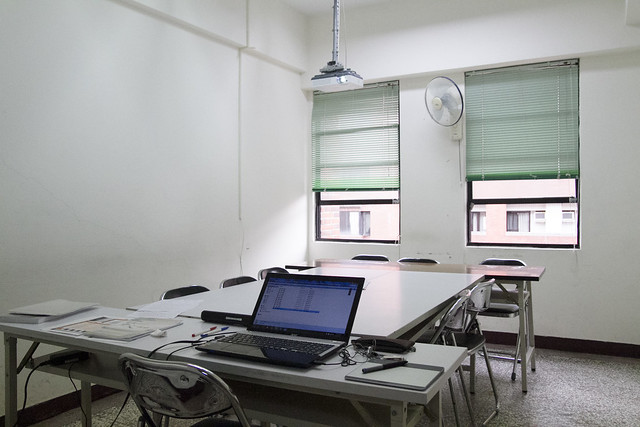
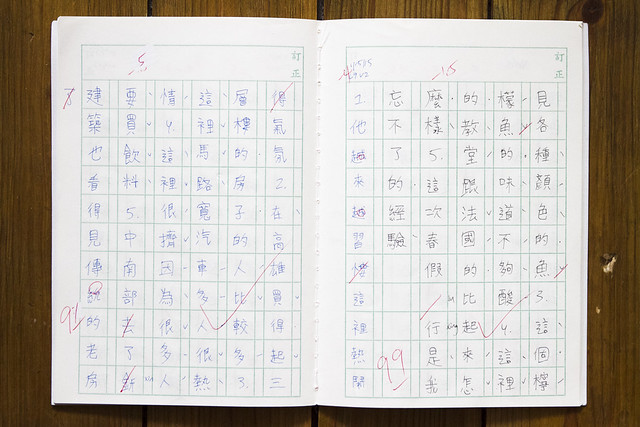
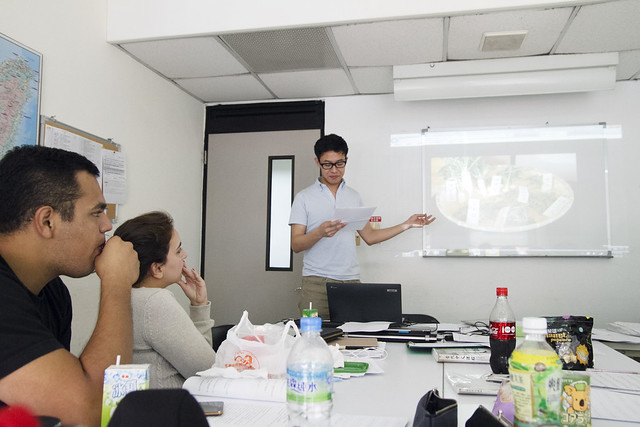


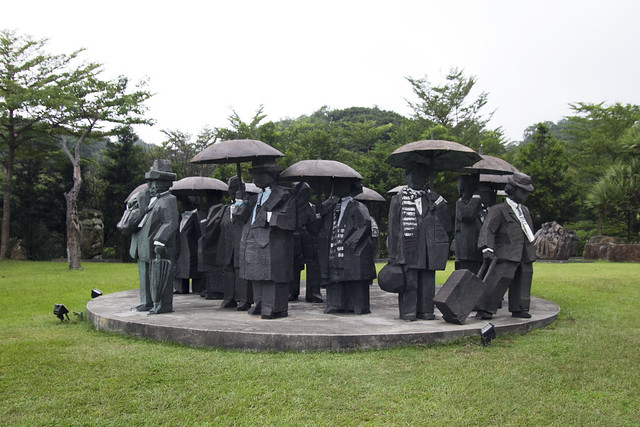
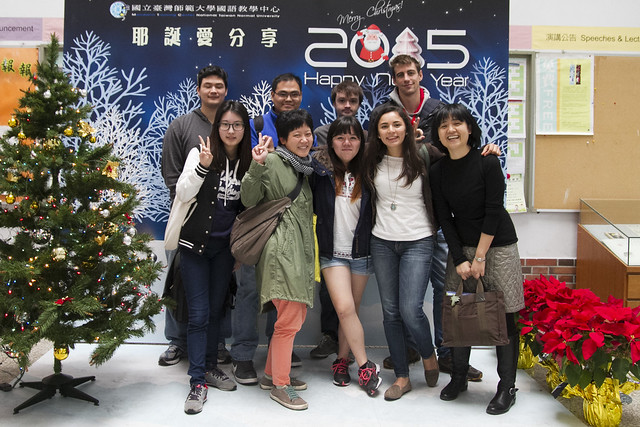
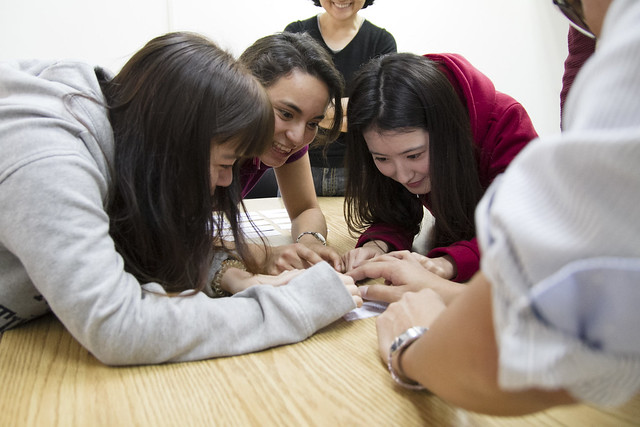
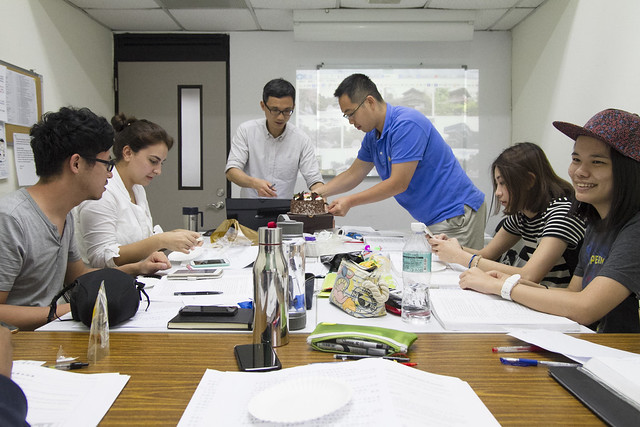
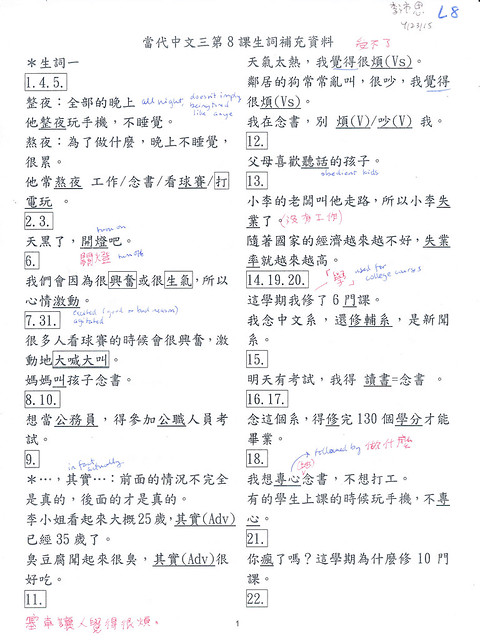
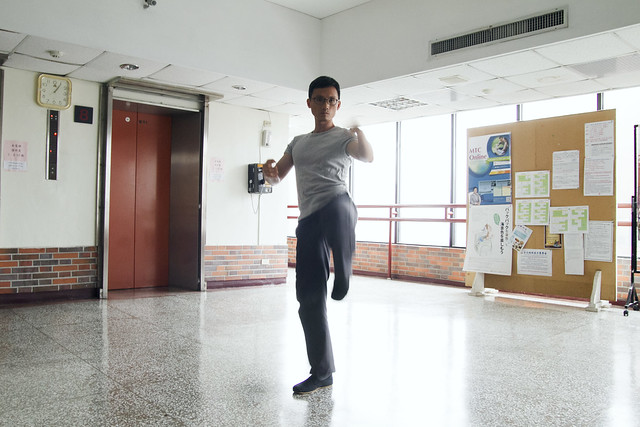
Comments